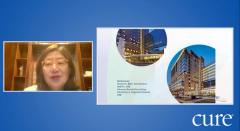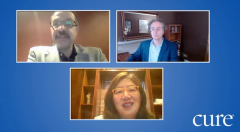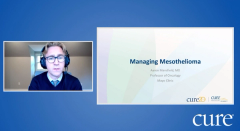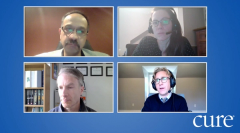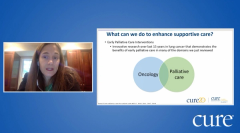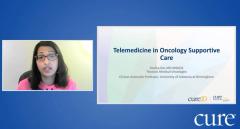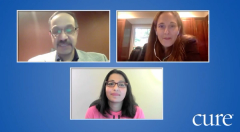
Educated Patient® Lung Cancer Summit Supportive Care Panel: October 1, 2022
Watch Dr. Hossein Borghaei, Dr. Jessica R. Bauman and Dr. Devika Das answer questions about supportive care during the CURE Educated Patient Lung Cancer Summit.
Episodes in this series

The supportive care panel was moderated by Dr. Hossein Borghaei and included Dr. Jessica R. Bauman and Dr. Devika Das.
Borghaei: A very timely discussion about telemedicine and palliative care, and also one that I don't think we spend enough time actually discussing and get into really. I think we have to do a better job just by the some of the questions that have come in. So I'm just going to read this question, because I think it sort of conveys some of the feelings that our patients get, and Dr. Bauman I think this sort of goes into some of the discussions that you've had. So the question basically says, going from an ECOG 4, stage 4, cancer free, my PTSD and anxiety are intense, but I am not allowed any treatment, because I'm not on active treatment. Who can help me with this?
Bauman: I think it really does illustrate some of the things that we deal with all the time, and that patients and their family members have to live with. I think this, I think, as oncologists, we are trained to give the best therapies. And this sounds like an amazing outcome when you think about the oncologic therapy for someone to have such a wonderful response, to be off treatment and on observation with stage 4 disease. That's what we want, right? That's what we hope for and want for our patients and families. But all of this, there's so much stress and uncertainty, certainly I can understand the emotional toll of this is so real. And I think that this is exactly why there are supportive care services.
So certainly, I think that this is a situation where both psychology as well as psychiatry could help. This is absolutely a situation where palliative care can help, right? Because again, it's an extra layer of support, someone to help you, to help patients and their families to digest what's happening to them. And I think that if there are certainly ways to get that, even if someone's not on active cancer treatment, both at cancer centers as well as through other modalities. I think that so much of what you said just in terms about telehealth, these are absolutely also situations in which telehealth may be very helpful, where if you're not regularly going to the cancer center every three weeks for IV treatment, sometimes it's not so easy to go to the cancer center. And so this is also where there have been innovative models of providing supportive care via telemedicine.
Borghaei: Dr. Das, any comments?
Das: No, 100% I agree with that. Again, this is where I feel privileged that I also get to work with veterans and I think that could be a model for health care throughout the country. (We have) ongoing mental health support for it, we have a mental health crisis in our country, regardless of the cancer diagnosis. And we have a significant shortage of providers who can do face-to-face mental health visits. So telemedicine is the perfect way to make sure we can have those periodic check-ins even if it's not in person. There are a lot of apps that are available now that patients and a lot of caregivers are using where there's these check ins. I don't feel well. I need to talk to someone and you know quickly. There are some AI-based questions in artificial intelligence that might not be a person. But if they find that you're at a high risk in terms of your symptoms, then at that point, you're connected to a human provider at that point to talk to. So again, this is where technology and medicine and legislation, we all have to come together and make sure our patients have continuous access to care not just while they're on therapy.
Borghaei: How does insurance affect telemedicine versus in person at this point?
Das: And that's where the slide is up there. I think it's very fractured. It is very disjointed. Some of the services are still available in some states. I think it's terrible that a physician in Alabama who might be an expert in something or is not able to provide care to a patient in Georgia, across state lines. You know, there is guidance around that where we can do it. Some of those were relaxed during the pandemic but again, those restrictions are coming back on. Again, we need advocacy, we need to be loud and not pull back those legislations, that we're helping our patients get across across state line. So that was the big one. So unless we are licensed in all 50 states we cannot provide telemedicine across 50 states. And this is just physicians. I know there are different rules for if you need a doctor or a mental health counselor or if you need to talk to somebody about financial planning. Again, these are things in 2022 that should not be restricted by state lines. And I think as a group, we have a voice to talk about this in the forefront.
Borghaei: That's great. I think you answered a couple of the questions that we had received. So thank you for that comprehensive response. I'm going to go back to Dr. Bauman: Can you lose access to palliative care if you start to improve?
Bauman: Absolutely not. So I think that this is so. I think that some of the confusion that continues to be a concern for some patients and families is sort of what palliative care means. And whether it means palliative, whether it means hospice and end-of-life care. And in the traditional model, once upon a time, that was more of what people thought of as palliative care. It really was equated to “Oh, we're at the point in time where we don't have other options. So now we're going to transition to end-of-life care, palliative care, hospice.” But that's really not what palliative care is anymore. Palliative care is a board specialty that is on the newer side. It is adding this extra layer of support at any point in time during a diagnosis.
And so I think that's the other piece that's important, is that we have a whole palliative care team in the outpatient setting. At Fox Chase (Cancer Center), for example, I can see any one of my patients at any point in time. And really, it is to help with symptom management, quality of life. And so even if someone's receiving curative therapy, our palliative care team is often involved, especially if the symptom is complex, is really significant. So certainly, I think that's a very important aspect to understand.
Borghaei: So what do you do if your cancer center or where you're receiving your treatment doesn't have integrative care? How do you access this at other places?
Bauman: So I think that's a very good question. I think that's, in some ways, when the model that we're studying right now is to determine, is telehealth palliative care the same as in-person palliative care? And if this study does show that these really are equivalent, then this idea of being able to tap into other places and their telehealth infrastructure may be one great option for that, especially if you live three hours from a city and can't go to it, they're the comprehensive center with all of the different resources, but you certainly could call on the phone or use a video interface. So I think that that's one of the ways that this door is opening to be able to allow people to get resources, if their own small cancer center doesn't, then at least you could potentially get other comprehensive resources from a distance.
Borghaei: Dr. Das, anything else?
Das: No, I completely agree. I think this is again, I keep coming back to the veterans model, but we already have this available at the VA, the National tele-oncology program. I could be providing care to a patient in the Dakotas sitting here in Alabama. So there is proof of principle that this works. We just need our insurance and legislation to expand that to all insurances and for all patients.
Borghaei: Agreed. And then lastly, Dr. Das, are you aware of any advocacy groups that can deal with some of these challenges that we've discussed in this area?
Das: I know ASCO, which is the American Society of Clinical Oncology, has periodically addressed this and is addressing this in a very loud manner right now. But I know a lot of the other sort of smaller lung cancer-specific advocacy groups, they talk about it. I'm not aware of any specific efforts that are ongoing right now through those groups. But again, I think this is where we could bring these up in our conversations.
Borghaei: Dr. Bauman, any last words?
Bauman: would just I would echo with what Dr. Das said. I think that certainly this is a big important aspect for us to be shouting from rooftops.
Transcription edited for clarity.
For more news on cancer updates, research and education, don’t forget to

